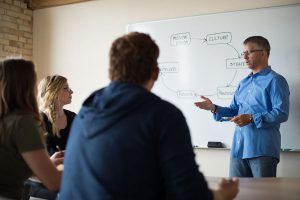Workshops

In this post, it may seem that I’m going against much of the advice I give my clients. I often encourage them to “Make sure your content is not self serving”; “Don’t be salesy, be helpful”; “Remember, it’s not about you, it’s about your buyer”. I give this advice because I know it works, and it’s the right thing to do. True success comes from seeking to help your customers first.
That’s why I want to tell you about my coaching practice’s biggest success from 2014: my Workshops.
“Wait a minute,” you say. “What was that about being ‘salesy’? Are you now going to give us a product pitch? Seems hypocritical, don’t you think?” Well, if I was planning on “pitching” my workshops, then yes, I’d agree. But that’s not what I want to do here. You see, I facilitated workshops for dozens of companies in 2014, and for each workshop, I received feedback such as…
“If you want to get a handle on content marketing, or just want to verify your current strategy, this is the place you need to be. Run, don’t walk to this workshop!”
“This workshop was great! It offered helpful content strategy and workflow tips as well as hands-on exercises and discussions. Definitely worth the time!”
“This workshop was well planned, well run, and extremely relevant to my day to day challenges. I got a much better sense of what things I was doing well, and what things I could do to further our progress. The group interaction and real-life examples we used were helpful. I also appreciated that I left with a clear ‘to do’ list to follow up on post-workshop. Overall, really well done and definitely worth attending.”
So via this post, I’m going to follow my own advice, and provide information to a larger audience with the hope that doing so will help them learn about a resource that may be of value to them or their organizations. I’ll do so by answering the questions I often get asked about the workshops:
What Is A Workshop?
The workshops are 1 or 2 day sessions facilitated by me to help teams build a framework for meeting their organizational or individual objectives. For each workshop, a “Tell, Show, Do, Review” approach is used…
- “Tell” participants what we want them to learn
- “Show” them how the concept works using real life examples
- “Do”…participants then apply the concept to their current situation.
- “Review”…participants present what they are working on. They then receive feedback from me and other workshop participants
What Areas Are Covered?
Currently, workshops are offered for the following areas:
- Strategic Planning. It’s amazing to me how many organizations operate without a plan, working instead in a reactionary way. The “One Day” Strategic Plan workshop helps organizational leaders conduct a SWOT analysis, create vision and mission statements, define corporate values, define objectives, and develop an action plan for implementation.
- Marketing – Demand Generation. Many small to mid-sized companies know they need a proactive demand generation strategy, but don’t know where to start in creating one. This workshop helps those companies develop the demand generation (marketing) knowledge and skills they need, while at the same time helping them to develop and implement demand generation framework that yields measurable results.
- LifeCharting™ Sometimes it’s the individual, not the organization that needs a plan. The LifeCharting workshop helps individuals to take a “timeout”, get some perspective, discover their own unique strengths, and develop a framework for making key decisions. Participants move beyond a life of simply seeking “success”, to living a life that makes an impact.
What Makes Your Workshops Different Than Other Seminars Or Conferences?
Learning is more than just obtaining information. True learning comes when information drives behavior change. The best way to obtain the information necessary for behavior change is through experience. My workshops are designed to give each participant “experiences” both during and after the workshop. Participants bring their current initiatives and issues to the workshop. During our time together, the workshop content and exercises allow them to apply newly learned principles to those initiatives and issues. After the workshop, their action plan and ongoing coaching keeps them experiencing what they learned during the workshop. This focus on “experiential learning” over the long term is what makes the outcomes different.
One of my father’s sayings is “I’m just one beggar showing another where to find some bread”. In the same way, I feel blessed that as I have developed my coaching practice, that I have found “some bread” that has helped move others forward, both personally and professionally. As 2015 begins, I’m looking forward to sharing it with others over the course of this year.
